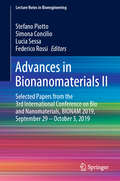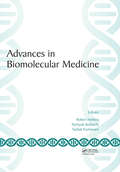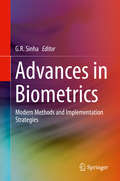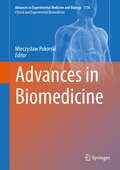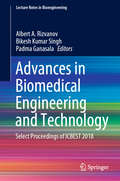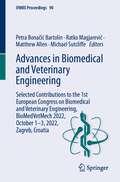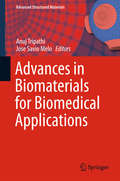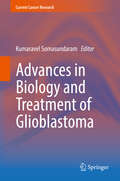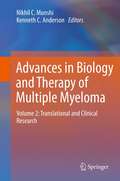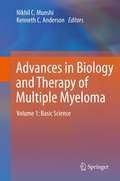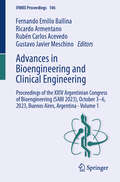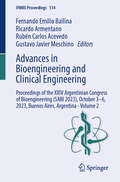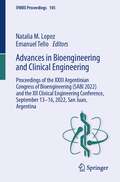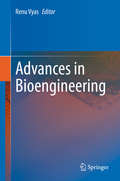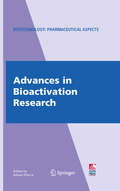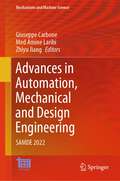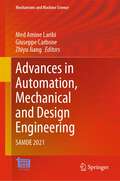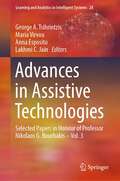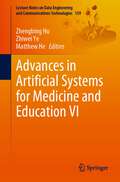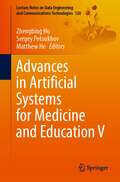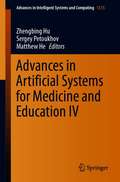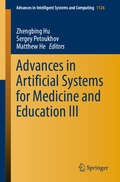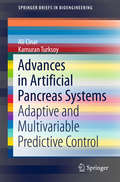- Table View
- List View
Advances in Bionanomaterials II: Selected Papers from the 3rd International Conference on Bio and Nanomaterials, BIONAM 2019, September 29 – October 3, 2019 (Lecture Notes in Bioengineering)
by Stefano Piotto Simona Concilio Lucia Sessa Federico RossiThis book presents multidisciplinary research focusing on the analysis, synthesis, and design of bio and nanomaterials. Merging biophysics, biochemistry, and bioengineering perspectives, it discusses the basic properties of materials and their interaction with biological systems; the development of new medical devices, such as implantable systems; and new algorithms and methods for modeling the mechanical, physical, and biological properties of biomaterials. The book gathers the proceedings of the 3rd International Conference on Bio and Nanomaterials, held on September 29–October 3, 2019, on an MSC cruise ship navigating the Mediterranean Sea. It particularly highlights Horizon 2020 projects, covering topics such as novel synthetic strategies for nanomaterials, the implementation of bio- and smart materials for pharmacological and medical purposes, as well as environmental applications. Intended for a broad audience of academics and professionals, it offers a comprehensive and timely snapshot of the field of biomaterials. In addition to a set of innovative theories together with the necessary practical tools for their implementation, it also addresses the current challenges in the field, fostering new discussions and possible future collaborations between diverse groups.
Advances in Biomolecular Medicine: Proceedings of the 4th BIBMC (Bandung International Biomolecular Medicine Conference) 2016 and the 2nd ACMM (ASEAN Congress on Medical Biotechnology and Molecular Biosciences), October 4-6, 2016, Bandung, West Java, Indonesia
by Robert HofstraAdvances in Biomolecular Medicine contains the selected papers presented at the 4th BIBMC (Bandung International Biomolecular Medicine Conference) and the 2nd ACMM (ASEAN Congress on Medical Biotechnology and Molecular Biosciences), hosted by the Faculty of Medicine, Padjadjaran University, Bandung, West Java, Indonesia, 4-6 October 2016. In line with the United Nations Sustainable Development Goals, the theme of the joint scientific meeting is ‘Medical innovation & translational research to ensure healthy lives & promote well-being for all at all ages’. Authors include scientists, academics, practitioners, regulators and other key individuals with expertise and experience relevant to biomolecular medicine, medical biotechnology and molecular biosciences. Topics of the papers cover various aspects of infection, oncology, tuberculosis, genetics, thalassemia, nutrition, cardiovascular, wound healing and endocrinology. This book is essential reading for academics, scientist, practitioners and regulators involved in the area of biomolecular medicine, medical biotechnology and molecular biosciences.
Advances in Biometrics: Modern Methods and Implementation Strategies
by G. R. SinhaThis book provides a framework for robust and novel biometric techniques, along with implementation and design strategies. The theory, principles, pragmatic and modern methods, and future directions of biometrics are presented, along with in-depth coverage of biometric applications in driverless cars, automated and AI-based systems, IoT, and wearable devices. Additional coverage includes computer vision and pattern recognition, cybersecurity, cognitive computing, soft biometrics, and the social impact of biometric technology. The book will be a valuable reference for researchers, faculty, and practicing professionals working in biometrics and related fields, such as image processing, computer vision, and artificial intelligence.Highlights robust and novel biometrics techniquesProvides implementation strategies and future research directions in the field of biometricsIncludes case studies and emerging applications
Advances in Biomedicine (Advances in Experimental Medicine and Biology #1176)
by Mieczyslaw PokorskiThis book gathers multidisciplinary articles that present advances of our understanding of diseases and the effective treatment of patients. The authors share recent clinical and experimental research findings, highlighting poorly understood areas with uncertain treatment outcomes, such as giant-cell bone tumors and their propensity to metastasize to the lungs; subterranean rehabilitation in pulmonary disorders; male reproductive hormone regulation during physical exercise in hyperbaric, hyperoxic environments, like underwater diving; and amelioration of cognitive decline owing to increased cerebral blood transit time after internal carotid artery stenting. Other topics include new concepts and innovations in the treatment of diabetes in pregnancy, and leg ulcers in chronic venous insufficiency, as well as molecular research on the toxic effects of oxidative stress, impaired cell autophagy, and experimental conditions resembling air pollution. Featuring the latest interdisciplinary advances in biomedicine, this book is a valuable resource for medical professionals, both academics and practitioners, and all allied health-care workers.
Advances in Biomedical Engineering and Technology: Select Proceedings of ICBEST 2018 (Lecture Notes in Bioengineering)
by Albert A. Rizvanov Bikesh Kumar Singh Padma GanasalaThis book comprises select peer-reviewed papers presented at the International Conference on Biomedical Engineering Science and Technology: Roadway from Laboratory to Market (ICBEST 2018) organized by Department of Biomedical Engineering, National Institute of Technology Raipur, Chhattisgarh, India. The book covers latest research in a wide range of biomedical technologies ranging from biomechanics, biomaterials, biomedical instrumentation to tele-medicine, internet of things, bioinformatics, medical signal and image processing. The contents aim to bridge the gap between laboratory research and feasible market products by identifying potential technologies to enhance functionalities of diagnostic and therapeutic devices. The book will be of use to researchers, biomedical engineers, as well as medical practitioners.
Advances in Biomedical and Veterinary Engineering: Selected Contributions to the 1st European Congress on Biomedical and Veterinary Engineering, BioMedVetMech 2022, October 1–3, 2022, Zagreb, Croatia (IFMBE Proceedings #90)
by Matthew Allen Michael Sutcliffe Petra Bonačić Bartolin Ratko MagjarevićThis book gathers selected peer-reviewed contributions to the 1st European Congress on Biomedical and Veterinary Engineering, BioMedVetMech 2022, held on October 1–3, 2022, in Zagreb, Croatia. It offers a timely snapshot of research findings and advances technologies in the area of biomechanics, rehabilitation and surgery. It covers applications of brain-computer interface, virtual reality and functional electrical stimulation, among others.
Advances in Biomaterials for Biomedical Applications (Advanced Structured Materials #66)
by Anuj Tripathi Jose Savio MeloThis book highlights recent advances in the field of biomaterials design and the state of the art in biomaterials applications for biomedicine. Addressing key aspects of biomaterials, the book explores technological advances at multi-scale levels (macro, micro, and nano), which are used in applications related to cell and tissue regeneration. The book also discusses the future scope of bio-integrated systems. The contents are supplemented by illustrated examples, and schematics of molecular and cellular interactions with biomaterials/scaffolds are included to promote a better understanding of the complex biological mechanisms involved in material-to-biomolecule interactions. The book also covers factors that govern cell growth, differentiation, and regeneration in connection with the treatment and recovery of native biological systems. Tissue engineering, drug screening and delivery, and electrolyte complexes for biomedical applications are also covered in detail. This book offers a comprehensive reference guide for multi-disciplinary communities working in the area of biomaterials, and will benefit researchers and graduate students alike.
Advances in Biomaterials
by Stuart M. LeeThis book discusses advanced instrumental techniques for the rapid bioassay of toxic materials, creep analysis of Delrin stents in cardiac bioprosthesis devices using finite element analysis, and the potential use of electron spectroscopy for chemical analysis for study of biomaterial surface.
Advances in Biology and Treatment of Glioblastoma (Current Cancer Research)
by Kumaravel SomasundaramThis volume covers the most important areas of glioblastoma - surgical resection, molecular pathology, targeted therapies, cancer stem cells, the role of DNA methylation, targeted sequencing for personalized therapy, animal models and advances in pediatric glioblastoma. Chapter authors are junior and senior investigators, who are well established in their particular areas and include neurosurgeons, neuropathologists, neurooncologists and basic scientists.
Advances in Biology and Therapy of Multiple Myeloma, Volume 2: Volume 2: Translational and Clinical Research
by Nikhil C. Munshi Kenneth C. AndersonDespite the advances in conventional, novel agent and high dose chemotherapy multiple myeloma (MM) remains incurable. In order to overcome resistance to current therapies and improve patient outcome, novel biologically-based treatment approaches are being developed. Current translational research in MM focusing on the development of molecularly-based combination therapies has great promise to achieve high frequency and durable responses in the majority of patients. Two major advances are making this goal possible. First, recent advances in genomics and proteomics in MM have allowed for increased understanding of disease pathogenesis, identified novel therapeutic targets, allowed for molecular classification, and provided the scientific rationale for combining targeted therapies to increase tumor cell cytotoxicity and abrogate drug resistance. Second, there is now an increased understanding of how adhesion of MM cells in bone marrow (BM) further impacts gene expression in MM cells, as well as in BM stromal cells (BMSCs). As a result of these advances in oncogenomics on the one hand and increased understanding of the role of the BM in the pathogenesis of MM on the other, a new treatment paradigm targeting the tumor cell and its BM microenvironment to overcome drug resistance and improve patient outcome has now been developed. Thalidomide, lenalidomide, and Bortezomib are three agents which target the tumor cell in its microenvironment in both laboratory and animal models and which have rapidly translated from the bench to the bedside. Ongoing efforts are using oncogenomics and cell signaling studies to identify next generation of therapies in MM on the one hand, and to inform the design of combination trials on the other. This new paradigm for overcoming drug resistance and improving patient outcome in MM has great promise not only to change the natural history of MM, but also to serve as a model for targeted therapeutics directed to improve outcome of patients with MM.
Advances in Biology and Therapy of Multiple Myeloma: Volume 1: Basic Science
by Nikhil C. Munshi Kenneth C. AndersonDespite the advances in conventional, novel agent and high dose chemotherapy multiple myeloma (MM) remains incurable. In order to overcome resistance to current therapies and improve patient outcome, novel biologically-based treatment approaches are being developed. Current translational research in MM focusing on the development of molecularly-based combination therapies has great promise to achieve high frequency and durable responses in the majority of patients. Two major advances are making this goal possible. First, recent advances in genomics and proteomics in MM have allowed for increased understanding of disease pathogenesis, identified novel therapeutic targets, allowed for molecular classification, and provided the scientific rationale for combining targeted therapies to increase tumor cell cytotoxicity and abrogate drug resistance. Second, there is now an increased understanding of how adhesion of MM cells in bone marrow (BM) further impacts gene expression in MM cells, as well as in BM stromal cells (BMSCs). As a result of these advances in oncogenomics on the one hand and increased understanding of the role of the BM in the pathogenesis of MM on the other, a new treatment paradigm targeting the tumor cell and its BM microenvironment to overcome drug resistance and improve patient outcome has now been developed. Thalidomide, lenalidomide, and Bortezomib are three agents which target the tumor cell in its microenvironment in both laboratory and animal models and which have rapidly translated from the bench to the bedside. Ongoing efforts are using oncogenomics and cell signaling studies to identify next generation of therapies in MM on the one hand, and to inform the design of combination trials on the other. This new paradigm for overcoming drug resistance and improving patient outcome in MM has great promise not only to change the natural history of MM, but also to serve as a model for targeted therapeutics directed to improve outcome of patients with MM.
Advances in Bioengineering and Clinical Engineering: Proceedings of the XXIV Argentinian Congress of Bioengineering (SABI 2023), October 3–6, 2023, Buenos Aires, Argentina - Volume 1 (IFMBE Proceedings #106)
by Ricardo Armentano Fernando Emilio Ballina Rubén Carlos Acevedo Gustavo Javier MeschinoThis book offers a timely snapshot of research, technologies and best practices in the broad area of bioengineering and clinical engineering. It reports on advances in biomechanics, biomedical image processing, biomaterials and tissue engineering. Further, it covers applications of artificial intelligence in biology and medicine, and instrumentation. Gathering the first volume of the proceedings of the XXIV Argentinian Congress of Bioengineering (SABI 2023), held on October 3–6, 2023, in Buenos Aires, Argentina - and organised by the Sociedad Argentina de Bioingeniería, this book provides an extensive source of information for both researchers and professionals in biomedical and clinical engineering.
Advances in Bioengineering and Clinical Engineering: Proceedings of the XXIV Argentinian Congress of Bioengineering (SABI 2023), October 3–6, 2023, Buenos Aires, Argentina - Volume 2 (IFMBE Proceedings #114)
by Ricardo Armentano Fernando Emilio Ballina Rubén Carlos Acevedo Gustavo Javier MeschinoThis book offers a timely snapshot of research, technologies and best practices in the broad area of bioengineering and clinical engineering. Contributions report on advances in biomedical signal processing, biosystem models and 3D printing applications, clinical engineering, and neuromuscolar system analysis and rehabilitation engineering. They also cover developments in bioengineering education. Gathering the second volume of the proceedings of the XXIV Argentinian Congress of Bioengineering (SABI 2023), held on October 3–6, 2023, in Buenos Aires, Argentina - and organised by the Sociedad Argentina de Bioingeniería, this book provides an extensive source of information for both researchers and professionals in biomedical and clinical engineering.
Advances in Bioengineering and Clinical Engineering: Proceedings of the XXIII Argentinian Congress of Bioengineering (SABI 2022) and the XII Clinical Engineering Conference, September 13–16, 2022, San Juan, Argentina (IFMBE Proceedings #105)
by Natalia M. Lopez Emanuel TelloThis book offers a timely snapshot of research, technologies and best practices in the broad area of bioengineering and clinical engineering. Contributions report on advances in biomechanics, biomaterials, and tissue engineering, biosensors and instrumentation, biomedical signal processing, and rehabilitation engineering. Further, it covers topics relating to quality engineering and management of health services, and of engineering education. The book gathers selected, peer-reviewed contributions to the XXIII Argentinian Congress of Bioengineering and the XII Clinical Engineering Conference, both known under the acronym “SABI 2022”, held on September 13–16, 2022, in San Juan, Argentina, and organized by the Sociedad Argentina de Bioingeniería.
Advances in Bioengineering
by Renu VyasThis book provides a single source of information on three major bioengineering areas: engineering at the cellular and molecular level; biomedical devices / instrument engineering; and data engineering. It explores the latest strategies that are essential to advancing our understanding of the mechanisms of human diseases, the development of new enzyme-based technologies, diagnostics, prosthetics, high-performance computing platforms for managing huge amounts of biological data, and the use of deep learning methods to create predictive models. The book also highlights the growing importance of integrating chemistry into life sciences research, most notably concerning the development and evaluation of nanomaterials and nanoparticles and their interactions with biological material. The underlying interdisciplinary theme of bioengineering is addressed in a range of multifaceted applications and worked out examples provided in each chapter.
Advances in Bioactivation Research (Biotechnology: Pharmaceutical Aspects #IX)
by Adnan ElfarraThis volume provides researchers with recent information on bioactivation reactions of drugs and toxicants. It also provides examples of how molecular and genomic biology, proteomics, mass spectrometry, and computational modeling are used in bioactivation research. In other sections, focus is on recent applications of bioactivation research in pharmacology, toxicology, and environmental health sciences, where contributors demonstrate the integration of bioactivation research.
Advances in Automation, Mechanical and Design Engineering: SAMDE 2022 (Mechanisms and Machine Science #138)
by Giuseppe Carbone Med Amine Laribi Zhiyu JiangThis book presents the proceedings of the 2022 3rd International Symposium on Automation, Mechanical and Design Engineering (SAMDE), held in Beijing, China, on December 16–18, 2022, and organized by the Hong Kong Society of Robotics and Automation (HKSRA). It gathers contributions by researchers from several countries on the following topics: digitalized development and use of sustainable products and manufacturing systems, artificial intelligence, automated reasoning, human–robot collaborative interaction, sensors and autonomous sensor systems, cyber-physical control systems, generative design including topology optimization, advanced simulation and modelling, intelligent automation, smart materials, materials processing and factories, and circular economy, etc. The book offers a source of information and inspiration for researchers seeking to improve their work and gather new ideas for future developments.
Advances in Automation, Mechanical and Design Engineering: SAMDE 2021 (Mechanisms and Machine Science #121)
by Med Amine Laribi Giuseppe Carbone Zhiyu JiangThis book presents the proceedings of the 2021 International Symposium on Automation, Mechanical and Design Engineering (SAMDE), held in Beijing, China, on 3–5 December 2021, and organized by the Hong Kong Society of Robotics and Automation (HKSRA). It gathers contributions by researchers from several countries on the following topics: digitalized development and use of sustainable products and manufacturing systems, artificial intelligence, automated reasoning, human-robot collaborative interaction, sensors and autonomous sensor systems, cyber-physical control systems, generative design including topology optimization, advanced simulation and modelling, intelligent automation, smart materials, materials processing and factories, and circular economy, etc. The book offers a source of information and inspiration for researchers seeking to improve their work and gather new ideas for future developments.
Advances in Asthma: Pathophysiology, Diagnosis And Treatment (Respiratory Disease Series: Diagnostic Tools And Disease Managements Ser.)
by Akihito YokoyamaThis book provides discussions on bronchial asthma from a clinical perspective, focusing on the recent studies on its pathophysiology, diagnosis and treatment. It also explores the lastest findings regarding the phenotypes and endotypes of asthmatic patients, making it of particular interest to those involved with non-eosinophilic asthma and eosinophilic asthma. Further, it discusses the importance of ILC 2 in eosinophilic asthma, and the accumulated results from the forced oscilliation technique and periostin that are actively practiced in Japan. As some aspects of diagnosis and treatment are different in Western and Asian countries, it is important that the data is disseminated around the globe. The clinical questions addressed by the authors are critical and thought provoking, while the questions raised by the editors are instructive, informative and provide new perspectives on unresolved issues. This book appeals to wide readership from beginning learners to physicians in clinical practice and scholars engaging in basic research.
Advances in Assistive Technologies: Selected Papers in Honour of Professor Nikolaos G. Bourbakis – Vol. 3 (Learning and Analytics in Intelligent Systems #28)
by George A. Tsihrintzis Maria Virvou Anna Esposito Lakhmi C. JainThis book aims at exposing its readers to some of the most significant advances in assistive technologies. Assistive technologies develop devices to assist vulnerable people, including elderly people, people with cognitive disabilities such as memory problems or dementia, and people with functional disabilities such as those needing support in toileting, moving around, eating, bathing, dressing, grooming, and taking personal care. The ever-increasing life expectancy and world population, along with the emergence of new diseases and the regrettable continuation of armed conflicts, press for development and availability of assistive technologies that offer people in need the opportunity to live secure and controlled lives with more active participation in society and at a reduced assistive cost. This task can be accomplished only with more advanced devices than traditional-powered wheelchairs or eating/drinking devices, including prosthetics, exoskeletons, visual and hearing aids, cognitive aids, and devices enhanced with artificial intelligence.The book consists of an editorial note and an additional twelve (12) chapters, all of which have been written by authors who work on the corresponding chapter theme and are recognized for their significant research contributions. In more detail, the chapters in the book are organized into four parts, namely (i) Advances in Assistive Technologies in Healthcare, (ii) Advances in Assistive Technologies in Medical Diagnosis, (iii) Advances in Assistive Technologies in Mobility and Navigation, and (iv) Advances in Privacy and Explainability in Assistive Technologies.This research book is directed towards professors, researchers, scientists, engineers, and students in assistive technologies. It is also directed towards readers who come from other disciplines and is interested in becoming versed in some of the most recent assistive technologies. An extensive list of bibliographic references at the end of each chapter guides its readers to probe further into the application areas of interest to them.
Advances in Artificial Systems for Medicine and Education VI (Lecture Notes on Data Engineering and Communications Technologies #159)
by Zhengbing Hu Zhiwei Ye Matthew HeThe book provides a thorough overview of recent developments in the design of AI systems and their uses in a range of industries, including education, technology, and bioinformatics. The papers in the proceedings were presented at the Sixth International Conference on Artificial Intelligence, Medical Engineering, and Education (AIMEE2022), which took place in Wuhan, China, from August 19 to 21, 2022. The book underlines the need for the intensification of training of an increasing number of appropriate specialists given the rapid growth of AI systems. In order to replicate human and other species' natural intelligence in digital AI systems, the researchers have been studying genetics and inherited biological processes in-depth. These studies offer fresh ideas for developing ever more powerful AI techniques. The featured articles cover a variety of themes in the fields of mathematics and biomathematics, medical approaches, technical and educational approaches, and medical approaches. The book is a compilation of recent academic papers in the discipline, covering a wide range of topics that are important to both business managers and engineers. This proceedings is a fantastic resource for asset management practitioners, researchers, and academics, as well as undergraduate and graduate students who are interested in AI, bioinformatics systems, and their developing applications. This is due to the breadth and depth of the proceedings. Experts, students, and other people who are interested in learning about how AI systems might be used in the future are the target audience.
Advances in Artificial Systems for Medicine and Education V (Lecture Notes on Data Engineering and Communications Technologies #107)
by Sergey Petoukhov Matthew He Zhengbing HuThis book broadly covers a scope of the latest advances for the development of artificial intelligence systems and their applications in various fields from medicine and technology to education. The proceedings comprise refereed papers presented at the Fifth International Conference of Artificial Intelligence, Medical Engineering, and Education (AIMEE2021), which took place at the Mechanical Engineering Institute of the Russian Academy of Sciences, Moscow, Russia, on 1–3 October 2021. Given the rapid development of artificial intelligence systems, the book emphasizes the need for the intensification of training of a growing number of relevant specialists, in particular, in medical engineering to increase the effectiveness of medical diagnosing and treatment. In digital artificial intelligence systems, scientists endeavour to reproduce the innate intellectual abilities of humans and other organisms, and the in-depth study of genetic systems and inherited biological processes can provide new approaches to create more and more effective artificial intelligence methods. Topics of the included papers concern thematic materials in the following spheres: mathematics and biomathematics; medical approaches; technological and educational approaches. The book is a compilation of cutting-edge research papers in the field, covering a comprehensive range of subjects that are relevant to business managers and engineering professionals alike. The breadth and depth of these proceedings make them an excellent resource for asset management practitioners, researchers, and academics, as well as undergraduate and postgraduate students who are interested in artificial intelligence, bioinformatics systems, also their expanding applications. The intended readership includes specialists, students, and other circles of readers who would like to know where artificial intelligence systems can be applied in the future with great benefit.
Advances in Artificial Systems for Medicine and Education IV (Advances in Intelligent Systems and Computing #1315)
by Zhengbing Hu Sergey Petoukhov Matthew HeThis book covers the latest advances for the development of artificial intelligence systems and their applications in various fields from medicine and technology to education. The proceedings comprise refereed papers presented at the Fourth International Conference of Artificial Intelligence, Medical Engineering, Education (AIMEE2020), held at the Mechanical Engineering Institute of the Russian Academy of Sciences, Moscow, Russia, in 3–4 October 2020. Given the rapid development of artificial intelligence systems, the book emphasizes the need for the intensification of training of a growing number of relevant specialists, in particular, in medical engineering to increase the effectiveness of medical diagnosing and treatment. In digital artificial intelligence systems, scientists endeavor to reproduce the innate intellectual abilities of human and other organisms, and the in-depth study of genetic systems and inherited biological processes can provide new approaches to create more and more effective artificial intelligence methods. Topics of the included papers concern thematic materials in the following spheres: mathematics and biomathematics; medical approaches; technological and educational approaches. The book is a compilation of state-of-the-art papers in the field, covering a comprehensive range of subjects that is relevant to business managers and engineering professionals alike. The breadth and depth of these proceedings make them an excellent resource for asset management practitioners, researchers, and academics, as well as undergraduate and postgraduate students interested in artificial intelligence and bioinformatics systems as well as their growing applications. Intended readership includes specialists, students, and other circles of readers who would like to know where artificial intelligence systems can be applied in the future with great benefit.
Advances in Artificial Systems for Medicine and Education III (Advances in Intelligent Systems and Computing #1126)
by Sergey Petoukhov Matthew He Zhengbing HuThis book discusses the latest advances in the development of artificial intelligence systems and their applications in various fields, from medicine and technology to education. It comprises papers presented at the Third International Conference of Artificial Intelligence, Medical Engineering, Education (AIMEE2019), held at the Mechanical Engineering Institute of the Russian Academy of Sciences, Moscow, Russia, on 1–3 October 2019. Covering topics such as mathematics and biomathematics; medical approaches; and technological and educational approaches, it is intended for the growing number of specialists and students in this field, as well as other readers interested in discovering where artificial intelligence systems can be applied in the future.
Advances in Artificial Pancreas Systems: Adaptive And Multivariable Predictive Control (Springerbriefs In Bioengineering Series)
by Ali Cinar Kamuran TurksoyThis brief introduces recursive modeling techniques that take account of variations in blood glucose concentration within and between individuals. It describes their use in developing multivariable models in early-warning systems for hypo- and hyperglycemia; these models are more accurate than those solely reliant on glucose and insulin concentrations because they can accommodate other relevant influences like physical activity, stress and sleep. <P><P> Such factors also contribute to the accuracy of the adaptive control systems present in the artificial pancreas which is the focus of the brief, as their presence is indicated before they have an apparent effect on the glucose concentration and so can be more easily compensated. The adaptive controller is based on generalized predictive control techniques and also includes rules for changing controller parameters or structure based on the values of physiological variables. Simulation studies and clinical studies are reported to illustrate the performance of the techniques presented.
